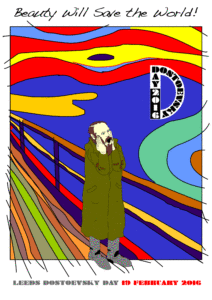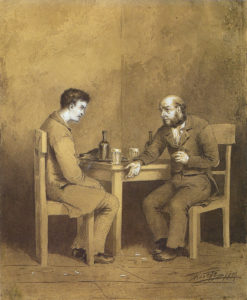Dostoevsky Day
Celebrating the 150th Anniversary of the Publication of Crime and Punishment
Friday 19 February 2016
Room B10, Parkinson Building, University of Leeds, Woodhouse Lane
14:00 Welcome and introduction
14:15 Discovering Crime and Punishment
Screening of an extract from the BBC’s 2002 adaptation of the novel, followed by discussion.
15:00 Translating Crime and Punishment
Oliver Ready (St Antony’s College, Oxford), translator of the 2014 Penguin edition of the novel, talks to Jacob Blakesley (Centre for Translation Studies, University of Leeds).
16:00 Being Dostoevsky
The work of Vladislav Mamyshev-Monroe, performance artist and Dostoevsky impersonator, displayed and discussed by Olga Andreevskikh (PhD student, University of Leeds).
16:30 Playing Dostoevsky
Eduard Chasovitin‘s Dostoevsky-inspired online games and web art, explored by Dan Fuller (PhD student, University of Leeds) in an interactive session. Bring your tablets/smartphones!
17:00 Re-imagining Crime and Punishment’s detective
R. N. Morris, author of a series of detective novels featuring Crime and Punishment’s Porfiry Petrovich, talks to Sarah Hudspith (School of Languages, Cultures and Societies, University of Leeds).
18:00 Concluding remarks, followed by Dostoevsky-themed quiz in The Packhorse pub (Woodhouse Lane). Prizes featuring original artwork!

